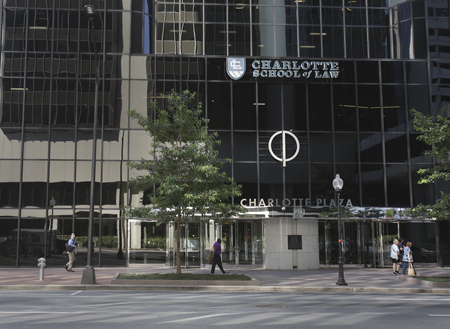Charlotte School of Law says it may get federal loan cash; Education Department says not so fast

The Charlotte School of Law. ABA Journal file photo by Albert Dickson.
The Charlotte School of Law announced that the U.S. Department of Education "is prepared to reinstate the school’s ability to award" federal student loan money under the Title IV program.
But that announcement seems aspirational at best, as an Education Department spokesperson said by email Monday: “Discussions are ongoing at this time. Until the discussions reach a successful conclusion, CSL will remain ineligible to participate in the Title IV programs.”
In a letter (PDF) dated Thursday and addressed to Charlotte School of Law President Chidi Ogene, the department told the law school it must provide the agency with a $6 million letter of credit to cover costs for a teach-out plan, for refunds for current and former students, and for any fines under Title IV of the Higher Education Act. The letter of credit must have a Dec. 31, 2018 expiration date.
Above the Law reported Monday “incredibly welcome news,” quoting a message to students that Charlotte School of Law is “confident the school will be able to satisfy the conditions specified by the department.”
A press release (PDF) on the school’s website quotes Charlotte School of Law’s Paul Meggett as saying: ‘We are excited at the prospect of being able to help our students complete their legal education. In the meantime, CSL continues to work closely with the American Bar Association and the UNC Board of Governors to resolve all remaining compliance-related matters.”
A Charlotte School of Law spokeswoman on Monday said there is no plan for a teach-out in the works. Generally, a teach-out plan includes completing the education of students already enrolled and then closing the school.
“No, there is no teach-out,” Victoria Taylor, Charlotte School of Law public relations director, said in an email. “This is a restoration of participation in the Title IV programs, which, like all certifications, will be subject to periodic renewal. While there is a provision in the line of credit that says it can be used to fund a teach-out, that language is standard for all DOE letters of credit and does not imply any expectation of a teach-out.”
The department’s July 27 letter also lists enrollment limitations for the school. That includes a June 2017 decision by the North Carolina’s Board of Governors committee that the law school admit no new students. The agency, which handles state authorization and licensure for nonpublic, post-secondary degree granting institutions, also ordered the law school to submit an ABA-approved teach-out or remedial plan no later than Aug. 10.
The ABA’s Section of Legal Education and Admissions to the Bar first informed the law school that it was out of compliance with various standards in February 2016, and again in July 2016. At neither time was the information shared with current or prospective students. The standards in question include 301(a), which states that law schools must maintain a legal education program that prepares students to be lawyers, and 501(a) and (b), which address admissions policies and practices.
Charlotte School of Law appealed the ABA finding, which was upheld (PDF) in October. At that time, the council of the section placed the law school on probation. In December, the Department of Education pulled the school’s law school loan funds, based on alleged misrepresentations the school made to current and future students.
Another condition for loan reinstatement detailed in July 27 letter is that Charlotte School of Law must adhere to the February 2016 reliable plan that the school submitted to the ABA. That includes a mandate that at least 75 percent of Charlotte’s first-year class admitted for the 2018 and 2019 fiscal years must have LSAT scores at or above 145.
Also, the law school must have an independent monitor by Sept. 15. “The monitor shall have no other financial, client or personal relationship with InfiLaw Holdings LLC, its directors, officers investors, debt providers, or affiliates,” reads the department letter, which was signed by Michael J. Frola, director of the agency’s multi-regional and foreign schools participation division.
Headline clarified Aug. 1 to say that Charlotte School of Law said the Department of Education may reinstate the school’s ability to award federal student loan money.



